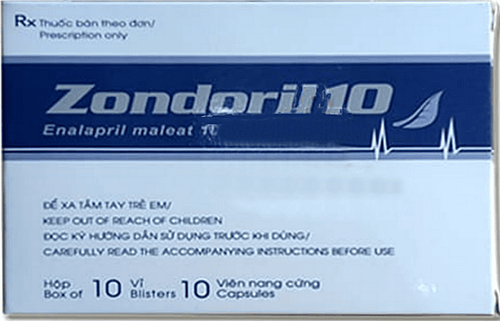This is an automatically translated article.
Bidinatec drug group of cardiovascular drugs. Effective in the treatment of essential hypertension. What precautions should be taken when using Bidinatec? Let's find out information about Bidinatec in the article below.
1. What is Bidinatec?
What is Bidinatec drug? Bidinatec is a drug belonging to the group of cardiovascular drugs. Indicated for the treatment of essential hypertension, hypertension due to kidney disease, hypertension with diabetes. The drug has the main active ingredient Enalapril maleate 10mg. Excipients include: Amidon de mais, Maltodextrin, Iron Oxide Red, Iron Oxide Yellow, Sodium stearyl fumarate, Lactose monohydrate.
Bidinatec drug is in the form of tablets. Packed in a box of 3 blisters x 10 tablets.
2. What are the effects of Bidinatec?
What does Bidinatec do? Bidinatec is composed of the main active ingredient, Enalapril. This is a substance that acts on the renin - angiotensin - aldosterone system by inhibiting ACE. Reduces peripheral arterial resistance and lowers blood pressure.
Bidinatec is indicated for use in the following subjects:
Treatment of essential hypertension. Patients with hypertension due to kidney disease. Patients with high blood pressure and high blood sugar. Treatment of symptomatic heart failure. Treatment and prevention of congestive heart failure. Prevention of ventricular dilatation after myocardial infarction.
3. How to use Bidinatec
3.1. How to use the drug Bidinatec For the drug Bidinatec, patients use it orally. Can be taken before or after a meal.
3.2. Dosage of Bidinatec The recommended dose must be adjusted according to the tolerance and response of each subject as follows:
Treatment of high blood pressure: Starting dose from 5mg to maximum 20mg, used once a day. Depends on the condition and degree of the patient's high blood pressure. After 2-4 weeks of treatment, the usual dose can be adjusted to 20mg/day, the maximum maintenance dose is 40mg/day. Treatment of heart failure: The starting dose is 2.5mg. Adjust dose after 2-4 weeks of treatment, maintenance dose 20-40mg/day, divided into 2 times. Patients should be closely monitored to determine the initial effect on blood pressure. Patients with renal impairment: For patients with a creatinine clearance (CrCl) in the range of 30 - 80 ml/min, an initial dose of 5 - 10 mg/day is recommended. CrCl in the range of 10-30 ml/min, starting dose 2.5mg/day. CrCl less than 10ml/min, starting dose is 2.5mg/day hemodialysis. Heart failure patients: Initial dose is 2.5mg, monitor the patient's condition to adjust the dose accordingly. Children: The recommended starting dose is 2.5 mg in patients 20 to less than 50 kg and 5 mg in patients 50 kg or more. Adjust the dose according to the patient's condition to a maximum of 20mg to a maximum of 40mg depending on body weight. 3.3. How to handle when forgetting, overdosing Missed dose: If you miss a dose, take it as soon as possible. However, if it is almost time for your next dose, skip the missed dose and take it exactly as directed. Do not take a double dose at the same time.
Overdose: If any undesirable symptoms occur when using an overdose of Bidinatec. It is necessary to immediately notify the treating doctor or the nearest medical facility for timely treatment.
3.4. Bidinatec is contraindicated in the following cases:
The patient is allergic, sensitive to Enalapril or any ingredient of the drug. The patient has a history of angioedema associated with angiotensin-converting enzyme (ACE) inhibitors. Patient has idiopathic/hereditary angioedema. Women who are pregnant in the second and third trimesters of pregnancy. Concomitant use of Enalapril with aliskiren-containing drugs is contraindicated in patients with diabetes mellitus or renal impairment (GFR < 60 ml/min/1.73 m2).
4. Notes when using Bidinatec
Notes and cautions when using Bidinatec
Patients with hypertension: Symptomatic hypotension may be experienced if the patient is hypovolemic while taking Enalapril. Patients with aortic or mitral valve hypertrophy/stenosis: ACE inhibitors should be used with caution, and should be avoided in patients with cardiogenic shock and significant hemodynamic obstruction. Patients with impaired renal function: Adjust the dose accordingly according to the patient's creatinine clearance and closely monitor the patient's functional response to therapy. Patients with hypertension due to renal vascular disease: The use of this drug may increase the risk of hypotension and renal failure in patients with renal artery stenosis. Renal transplantation: Enalapril is not recommended because of the lack of experience in patients with recent kidney transplantation. Hepatic Impairment: Discontinue use in patients who develop jaundice or marked elevation of liver enzymes. Neutropenia or agranulocytosis: Bidinatec should be used with caution in patients with collagen vascular disease, on immunosuppressive therapy, and on allopurinol or procainamide. Angioedema - Neurological: Discontinue use immediately when symptoms of vascular-neurovascular edema appear in the face, limbs, lips, tongue, glottis or larynx. Bidinatec contains lactose and therefore should not be administered to patients with galactose intolerance. Pregnancy and breast-feeding: The drug should not be used during pregnancy or lactation. Consider benefit/risk or alternative therapy for mother and fetus. Children: Enalapril is not recommended for use in infants and children with a glomerular filtration rate < 30 ml/min/1.73 m2 due to the lack of data. Drivers and Machine Operators: Be careful when using this drug, Enalapril sometimes causes dizziness and fatigue. Side effects when using Bidinatec
Blood drugs: Anemia, aplastic anemia and hemolytic anemia, decrease in hemoglobin, decrease in haematocrit, neutropenia, thrombocytopenia, lymphoma, autoimmune disease. Nervous system and nervous system: Headache, depression, confusion, irritability, sleep disturbance, paresthesia, dizziness. Eye disorders: Blurred vision. Nutritional and metabolic disorders: Hypoglycemia. Cardiovascular disorders: Hypotension, syncope, myocardial infarction, tachycardia, cerebrovascular accident, Raynaud's phenomenon. Respiratory disorders: Cough, dyspnoea, pharyngitis, bronchospasm, pulmonary infiltrates, rhinitis, allergic alveolitis, eosinophilic pneumonia. Gastrointestinal disorders: Nausea, vomiting, diarrhea, intestinal obstruction, pancreatitis, gastric irritation, gastric ulcer, glomerulonephritis. Liver and biliary disorders: Liver failure, hepatitis, cholestasis. Skin: Rash, angioedema, pruritus, alopecia, Stevens - Johnson syndrome. Other disorders: Asthenia, fatigue, flushing, cramps. Patients should notify their doctor immediately if they experience any adverse reactions while taking the drug.
Interactions and incompatibilities with Bidinatec drugs: Do not use Bidinatec at the same time with diuretics, potassium supplements, antihypertensive drugs, lithium, antipsychotics, anesthetics, narcotics, drugs. sympathomimetics, antidiabetic drugs, anti-inflammatory drugs thrombolytics, acetylsalicylic acid.
Consult your doctor when intending to use Bidinatec simultaneously with any other drugs to avoid possible unwanted effects.
Preservation of Bidinatec: Store the drug at a temperature not exceeding 30°C, avoid direct sunlight, avoid moisture, keep in a cool and dry place.
Above is all necessary information when using Bidinatec medicine. Bidinatec is a prescription drug, users need to strictly follow the doctor's instructions when using the drug. Hopefully, the article has provided all the necessary notes for readers when using Bidinatec.
Follow Vinmec International General Hospital website to get more health, nutrition and beauty information to protect the health of yourself and your loved ones in your family.
Please dial HOTLINE for more information or register for an appointment HERE. Download MyVinmec app to make appointments faster and to manage your bookings easily.













